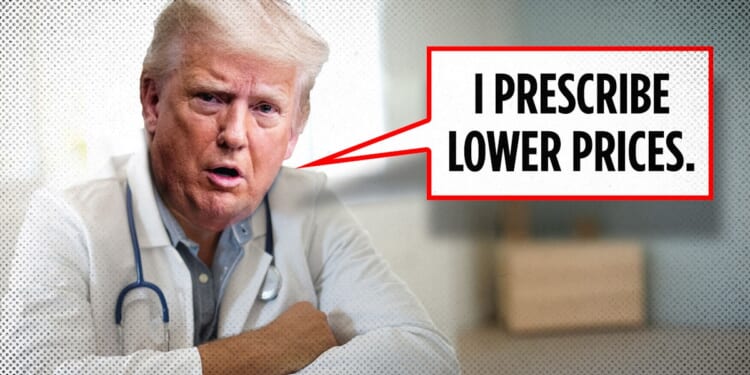As Americans struggle to pay their bills, one recurring issue over the years has been the exorbitant price of prescription drugs.
Presidents and members of Congress have talked endlessly about the high cost of healthcare with little to show for it.
But President Donald Trump issued an executive order in May, which, in part, explained, “The United States has less than five percent of the world’s population and yet funds around three quarters of global pharmaceutical profits. This egregious imbalance is orchestrated through a purposeful scheme in which drug manufacturers deeply discount their products to access foreign markets, and subsidize that decrease through enormously high prices in the United States.”
Then the president put pressure on drug companies this summer. As Investor’s Business Daily reports, “At the end of July, the administration sent letters to 17 drugmakers, demanding they voluntarily reduce the prices of drugs in the U.S. to match what patients in other similarly wealthy nations pay. The deadline for them to respond was Monday.” Forbes adds, “The order demanded ‘most-favored-nation’ pricing for prescription drugs — which would be their lowest cost sold in any other country. Trump has frequently railed against pharmaceutical companies for charging higher prices in the U.S.”
Now, it appears that we’re on the verge of realizing significant savings, as the Trump administration has struck a deal with Pfizer, one of the largest pharmaceutical companies. “The deal Pfizer cut with the White House will give the company a three-year grace period on Trump’s planned tariffs on pharmaceuticals made abroad,” NBC News reports. “The agreement on lower prices will cover a ‘large majority’ of Pfizer’s primary care medicines, along with specialty brand-name drugs, which will be offered at discounts averaging 50% and reaching as high as 85%, a spokesperson for the company said.”
Part of the deal is the administration’s launching of a new website in 2026 called TrumpRx. The site won’t directly sell drugs to consumers but will provide them with resources and links directly to Pfizer, where they can shop for medications at discounted prices. “The president said the site would be a place where Americans can buy prescription medications at a discounted rate directly, not through insurance. He said the move would help improve healthcare access for low-income Americans,” according to ABC News.
Some examples of reduced costs include prescriptions for conditions such as migraines, eczema, and rheumatoid arthritis, which can drop by anywhere from 40% to as much as 80%.
However, as with any new program, some wrinkles need to be ironed out. As the New York Post explains, “Many aspects of the ambitious plan intended to equalize drug costs between the US and other major Western countries remain unclear. It’s also not certain what benefits, if any, would flow to customers with private insurance, who comprise about two-thirds of the US population. It is not known, for example, what companies in addition to Pfizer may join the initiative before it launches.”
The deal seems like a win-win situation for the Trump administration and for Pfizer.
“For Pfizer, the agreement with the White House brings more certainty to issues that have been hanging over it and other drugmakers: the threat of tariffs and the pressure to cut prices,” states The Wall Street Journal. “Pfizer’s concessions might have only a limited impact on its sales and profit, and serve as a blueprint for similar White House deals with other drugmakers.” The Journal adds, “The officials said the U.S. Trade Representative and Commerce Department would press other countries to pay more for drugs, and that Pfizer had committed to sharing some of that increased revenue with U.S. taxpayers, likely by offering enhanced discounts to Medicare patients.”
The agreement with Pfizer includes benefits that go beyond lowering prescription drug prices. CNBC details, “Trump’s Tuesday agreement with the company to voluntarily lower U.S. drug prices included a three-year exemption from pharmaceutical-specific tariffs, as long as the firm further invests in domestic manufacturing. Pfizer on Tuesday pledged to put $70 billion into U.S. manufacturing and research, on top of previous investments. That deal brought relief and clarity to Pfizer and the broader pharmaceutical industry, signaling that many drugmakers could strike similar agreements that would make them immune to the levies for most of Trump’s term.”
And now it looks like Pfizer may not be the only company to respond to the Trump administration’s demands. CNBC adds, “Trump on Tuesday said he’s working with other drugmakers to secure similar pacts over the next week, and the White House confirmed that Eli Lilly is expected to strike the next drug pricing deal.”
One of the criticisms of TrumpRx is that the majority of Americans have some form of health insurance, which allows them to buy discounted drugs as part of their policies. However, there are nearly 30 million Americans without any health insurance at all, and that alone might make this initiative worthwhile. At the same time, drug prices are so high that even with discounts, some drugs may still be out of reach for those with lower incomes.
If Trump’s plan is successful in actually lowering prices, it will be welcome. If we can encourage more companies to manufacture medicines here at home and work toward lowering drug prices for those who can’t afford them, that’s a prescription that’s good for everyone.















